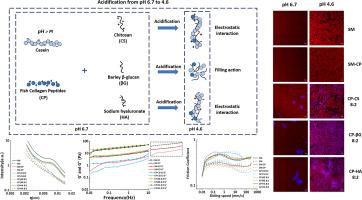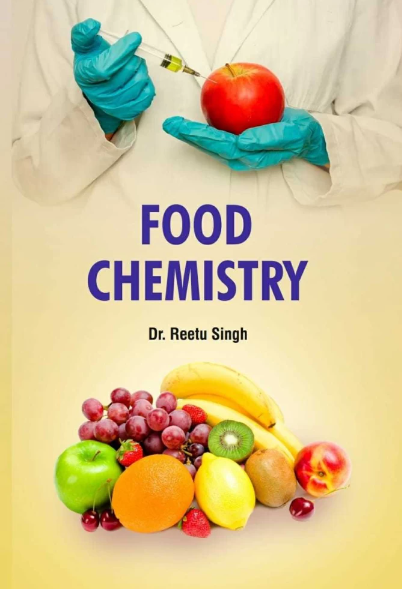Rheological and tribological properties of skimmed milk gels: The impact of fish collagen peptides-polysaccharides complexes during acidification
IF 9.8
1区 农林科学
Q1 CHEMISTRY, APPLIED
引用次数: 0
Abstract
Collagen peptides (CP) are widely utilized in dairy products for stabilization, gelation, and fat replacement. However, the mechanism of CP-polysaccharides complexes on the rheology and lubrication properties of skimmed yogurt remains underexplored. This study investigated effects of 0.5 % fish CP and its complexes with chitosan (CS), β-glucan (βG), and sodium hyaluronate (HA) on the structural, rheological, tribological, and sensory attributes of skimmed milk during acidification. Small-angle X-ray scattering revealed acidification at pH 4.6 caused a smoothing of high-q features, suggesting casein micelles aggregation and a more homogeneous gel structure. Microscopic analyses indicated CP addition, particularly with βG (CP-βG, 8:2 & 6:4), improved gel continuity and reduced syneresis, thereby enhancing creaminess and smoothness. Conversely, the CS addition and elevated HA concentrations disrupted the casein network, increasing syneresis due to polyelectrolyte complex formation and bridging flocculation. These findings suggested specific CP-polysaccharides combinations could potentially improve the quality of skimmed yogurt.


脱脂乳凝胶的流变学和摩擦学特性:鱼胶原蛋白肽-多糖复合物在酸化过程中的影响
胶原蛋白肽(CP)广泛用于乳制品的稳定,凝胶化和脂肪替代。然而,多糖复合物对脱脂酸奶流变学和润滑性能的影响机制尚不清楚。本研究考察了0.5% %鱼CP及其与壳聚糖(CS)、β-葡聚糖(βG)和透明质酸钠(HA)配合物在酸化过程中对脱脂牛奶结构、流变学、摩擦学和感官特性的影响。小角度x射线散射显示,pH 4.6的酸化导致高q特征平滑,表明酪蛋白胶束聚集和更均匀的凝胶结构。显微分析表明,添加了CP,特别是βG (CP-βG, 8:2;6:4),提高了凝胶的连续性,减少了协同作用,从而提高了奶油性和光滑性。相反,CS的加入和HA浓度的升高破坏了酪蛋白网络,由于多电解质复合物的形成和桥接絮凝而增加了协同作用。这些发现表明,特定的cp -多糖组合可能会提高脱脂酸奶的质量。
本文章由计算机程序翻译,如有差异,请以英文原文为准。
求助全文
约1分钟内获得全文
求助全文
来源期刊

Food Chemistry
工程技术-食品科技
CiteScore
16.30
自引率
10.20%
发文量
3130
审稿时长
122 days
期刊介绍:
Food Chemistry publishes original research papers dealing with the advancement of the chemistry and biochemistry of foods or the analytical methods/ approach used. All papers should focus on the novelty of the research carried out.
 求助内容:
求助内容: 应助结果提醒方式:
应助结果提醒方式:


